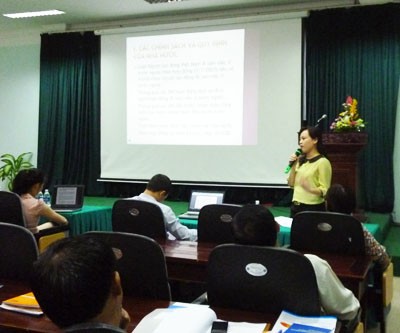Workshop on the Rights of Women Migrant Workers in Ho Chi Minh city organized by UN Women and MOLISA (DOLAB)
Date:
Seventy participants from Department of Labour, Invalids and Social Affairs, Women Unions, Department of Justice, and Recruiting Enterprises from 24 provinces in South Central Coast and Mekong River Delta attended the workshop on the Rights of Women Migrant Workers in Ho Chi Minh city organized by UN Women and Ministry of Labour Invalids and Social Affairs of Viet Nam (MOLISA)

Ms. Vu Hong Minh, Chief of the Office
DOLAB presents at the workshop
In Asia and the Pacific, Viet Nam is a significant and growing country of origin for women migrant workers. Since 2006, Viet Nam has been sending 70,000 to 90,000 women and men workers overseas annually. According to official data available on regular or documented migration, in recent years, women’s representation among international labour migrants from Viet Nam is steadily increasing. Women made up over one third of registered outgoing migrants in 2011. There are indications that the demand for women migrants will increase in destinations such as Taiwan and Malaysia, where Vietnamese women’s skills and hard working reputation are reportedly in demand. Vietnamese migrants are mainly going to Taiwan, Malaysia, the Republic of Korea (South Korea), Japan, and Macao, as well as to Cambodia, Lao PDR, and Gulf countries, primarily Saudi Arabia, United Arab Emirates and Libya. In 2011 more than half of women labour migrants went to Taiwan, followed by Malaysia (14%), the Republic of Korea, Japan and Macao (approximately 6% each). In the same year men went to a wider range of countries, including Taiwan (37%), the Republic of Korea (24%), Malaysia (9%) and Japan (9%) and several countries in the Middle East. These patterns reflect the gendered nature of migrant labour sectors in these destination countries and territories.
Despite the steady growth in the number of women migrating from Viet Nam, the specific rights and needs of Vietnamese women migrant workers have not received a great deal of attention and have not been institutionalized in policy, law and related service provisions. The government of Viet Nam and the Department of Overseas Labour (DOLAB) under the Ministry of Labour, Invalids and Social Affairs (MOLISA) are concerned to develop measures to help women and men benefit equally from labour migration. Under the project “Empowering Women Migrant Workers in Viet Nam”, UN Women is working with the DOLAB towards more gender-sensitive and rights based policy and practices in labour migration management. The project is guided by the twin principles of protection – paying attention to areas where women experience vulnerability; and empowerment – creating opportunities for women’s improved economic and social status throughout the migration process.
The principal objective of the capacity building workshop in Ho Chi Minh city is to support Government staff with tasks relating to international labour migration, especially the provincial steering committees will be equipped with knowledge and skills on international migration laws, women human rights and international instrument. The training will focus on contents such as CEDAW, the Migrant Workers Convention, ASEAN Declaration on the Protection and Promotion of the Rights of Migrant Workers and other human rights instruments to address women migrant workers’ concerns. The training knowledge will be evaluated through evaluation forms.
In 2011, 04 training workshops for Provincial MOLISA Offices, Women’s Union and Other Government Officials Who Handle Labour Export in provinces have been organized by the Department of Overseas Labour with technical and financial assistance from UN Women with active participation of the 140 participants from 100 licensed recruitment companies, 120 desk officers from 18 provincial Departments of Labour, War invalids and Social affairs. The evaluation results from these trainings show significant improvement of knowledge on women human rights and the international instruments for protection of the rights of women migrant workers. In July 2012, UN Women in collaboration with IOM has organized two international training workshops on International Migration Laws for Government staff, UN Women regional staff and UN Agencies in Viet Nam.
The workshop is within the framework of the UN Women’s Regional Programme on Asia Pacific and Arab States Regional Programme on Empowering Women Migrant Workers in Asia. This programme includes 10 countries (Cambodia, Indonesia, Lao PDR, Philippines, Viet Nam, Thailand, Jordan, India, Nepal, and Bangladesh). The Viet Nam project will share and contribute to the goals of the overall programme by adopting a multi-stakeholder, gender responsive, rights based approach and addressing the issues concerning Vietnamese women migrants throughout the migration cycle. The Project in Viet Nam also contributes to attain the goals on gender mainstreaming in decent work in UN One Plan 2012-2016, specifically the Outcome 1.2 “By 2016, institutions create opportunities for decent work for people of working age, particularly the most vulnerable and disadvantaged, to benefit in the process of socio-economic transformation” and Output 1.2.4: “Employment policies are strengthened to prevent and address discrimination and exploitation of internal and external migrant workers, and other disadvantaged groups in the labour market due to their sex, HIV status or disability